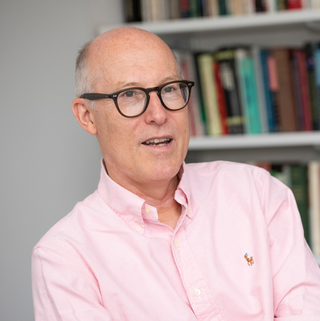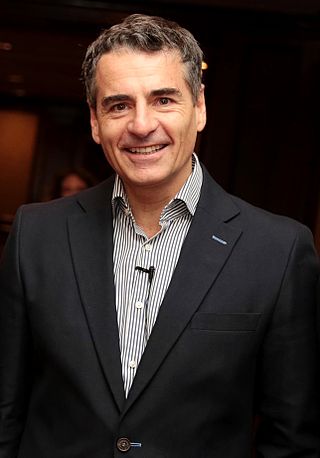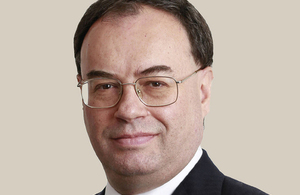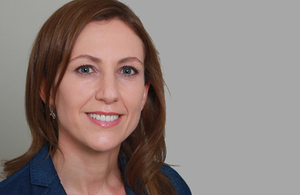Related Research Articles

Free trade is a trade policy that does not restrict imports or exports. It can also be understood as the free market idea applied to international trade. In government, free trade is predominantly advocated by political parties that hold economically liberal positions, while economic nationalist and left-wing political parties generally support protectionism, the opposite of free trade.

Franco Modigliani was an Italian-American economist and the recipient of the 1985 Nobel Memorial Prize in Economics. He was a professor at University of Illinois at Urbana–Champaign, Carnegie Mellon University, and MIT Sloan School of Management.

The Corn Laws were tariffs and other trade restrictions on imported food and corn enforced in the United Kingdom between 1815 and 1846. The word corn in British English denotes all cereal grains, including wheat, oats and barley. They were designed to keep corn prices high to favour domestic producers, and represented British mercantilism. The Corn Laws blocked the import of cheap corn, initially by simply forbidding importation below a set price, and later by imposing steep import duties, making it too expensive to import it from abroad, even when food supplies were short. The House of Commons passed the corn law bill on March 10, 1815, the House of Lords on March 20 and the bill received Royal assent on March 23, 1815.
Government failure, in the context of public economics, is an economic inefficiency caused by a government intervention, if the inefficiency would not exist in a true free market. The costs of the government intervention are greater than the benefits provided. It can be viewed in contrast to a market failure, which is an economic inefficiency that results from the free market itself, and can potentially be corrected through government regulation. However, Government failure often arises from an attempt to solve market failure. The idea of government failure is associated with the policy argument that, even if particular markets may not meet the standard conditions of perfect competition required to ensure social optimality, government intervention may make matters worse rather than better.

Kamer Daron Acemoğlu is a Turkish-born American economist who has taught at the Massachusetts Institute of Technology (MIT) since 1993. He is currently the Elizabeth and James Killian Professor of Economics at MIT. He was named Institute Professor in 2019.

Barry Julian Eichengreen is an American economist and economic historian who holds the title of George C. Pardee and Helen N. Pardee Professor of Economics and Political Science at the University of California, Berkeley, where he has taught since 1987. Eichengreen currently serves as a research associate at the National Bureau of Economic Research and as a Research Fellow at the Centre for Economic Policy Research.

Charles Albert Eric Goodhart, is a British economist. His career can be divided into two sections: his term with the Bank of England and its associated public policy; and his academic work with the London School of Economics. Charles Goodhart's work focuses on central bank governance practices and monetary frameworks. He also conducted academic research into foreign exchange markets. He is best known as the founder of Goodhart's Law, which states: "When a measure becomes a target, it ceases to be a good measure."

Sir Timothy John Besley, is a British academic economist who is the School Professor of Economics and Political Science and Sir W. Arthur Lewis Professor of Development Economics at the London School of Economics (LSE).

Andrés Velasco Brañes is a Chilean economist and professor who served as Minister of Finance in the first government of President Michelle Bachelet from March 2006 to March 2010. He is currently the Dean of the School of Public Policy at the London School of Economics.
Sharyn O’Halloran is the George Blumenthal Professor of Political Economics and Professor of International and Public Affairs and serves as the Senior Vice Dean and Chief Academic Officer at the School of Professional Studies at Columbia University in New York City. A political scientist and economist by training, O’Halloran has written extensively on issues related to the political economy of international trade and finance, regulation and institutional reform, economic growth and democratic transitions, and the political representation of minorities.

Andrew John Bailey is a British central banker who has been Governor of the Bank of England since 16 March 2020.
Philippe Mario Aghion FBA is a French economist who is a professor at College de France, at INSEAD, and at the London School of Economics. He is also teaching at the Paris School of Economics. Philippe Aghion was formerly the Robert C. Waggoner Professor of Economics at Harvard University. Prior to that, he was a professor at University College London, an Official Fellow at Nuffield College, Oxford, and an Assistant Professor at the Massachusetts Institute of Technology (MIT).

Frank Horace Hahn FBA was a British economist whose work focused on general equilibrium theory, monetary theory, Keynesian economics and critique of monetarism. A famous problem of economic theory, the conditions under which money, which is intrinsically worthless, can have a positive value in a general equilibrium, is called "Hahn's problem" after him. One of Hahn's main abiding concerns was the understanding of Keynesian (Non-Walrasian) outcomes in general equilibrium situations.
Julia Mary Black is the strategic director of innovation and a professor of law at the London School of Economics and Political Science (LSE). She was the interim director of the LSE, a post she held from September 2016 until September 2017, at which time Minouche Shafik took over the directorship. She is the president of the British Academy, the UK's national academy for the humanities and social sciences, and became the academy's second female president in July 2021 for a four-year term.
Nicola Mary Lacey, is a British legal scholar who specialises in criminal law. Her research interests include criminal justice, criminal responsibility, and the political economy of punishment. Since 2013, she has been Professor of Law, Gender and Social Policy at the London School of Economics (LSE). She was previously Professor of Criminal Law and Legal Theory at LSE (1998–2010), and then Professor of Criminal Law and Legal Theory at the University of Oxford and a Senior Research Fellow of All Souls College, Oxford (2010–2013).

Silvana Tenreyro is a British-Argentine economist who is Professor of Economics at the London School of Economics and External Member of the Bank of England's Monetary Policy Committee since July 2017. She currently serves as the president of the European Economic Association for 2021.
Bronwyn Nanette Curtis is a British Australian Economist with focuses onFinance, Economics and Media sectors. She has held positions such as the Head of Global Research at HSBC Bank, Chief Economist at Nomura International, Managing Editor and Head of European Broadcast at Bloomberg LP and Senior Economist/Bond Strategist with Deutsche Bank Group. Until recently, Bronwyn Curtis served as the Governor for the London School of Economics (LSE). In 2008, she received the OBE award for outstanding service to business economics and in 2017 received an honorary doctorate from her alma mater. Bronwyn currently serves on a number of committees and is frequently called upon to speak at various conferences on matters relating to trade and finance.

Robin Elizabeth Mansell, is a Canadian-British scholar, who is Professor of New Media and Internet and was the Head of the Department of Media and Communications at the LSE. She is an expert on the internet and copyright and has published books on the subject.
References
- ↑ Hurley, James; Griffiths, Katherine (28 October 2019). "Andrew Bailey interview: The Bank, the job vacancy and Andrew Bailey, the man who would be king". The Times. Retrieved 25 December 2019.
- ↑ "Professor Cheryl Schonhardt-Bailey (FBA)". London School of Economics and Political Science. Retrieved 24 July 2018.
- ↑ "Cheryl Schonhardt-Bailey | Home".
- ↑ "Cheryl Schonhardt-Bailey". Google Scholar Citations. Retrieved 24 July 2018.
- ↑ "British Academy Fellowship reaches 1,000 as 42 new UK Fellows are welcomed". 16 Jul 2015.
- ↑ "Curriculum Vitae" (PDF). Cheryl Schonhardt-Bailey. Retrieved 24 July 2018.
- ↑ "The wife of new Bank chief Andrew Bailey once confronted a grizzly bear". Daily Mirror . 20 December 2019.